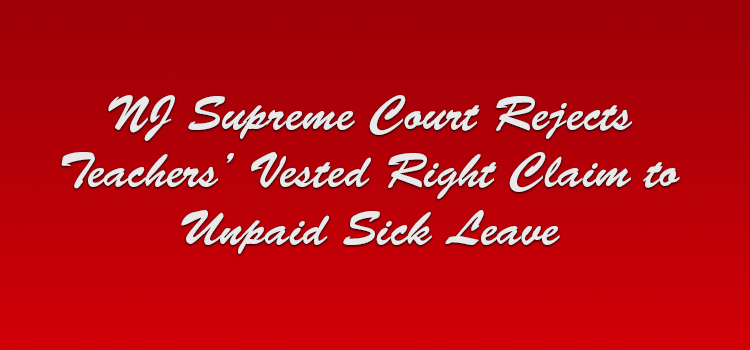In Barila v. Board of Education of Cliffside Park (A-39-18/081626) (Decided April 20, 2020), the Supreme Court of New Jersey held that Cliffside Park teachers’ right to compensation for unused sick leave did not constitute a vested right, and that the Board of Education of Cliffside Park and the Cliffside Park Education Association had the authority to negotiate a limitation on those rights in exchange for concessions by the Board on other issues.

Facts of Barila v. Board of Education of Cliffside Park
The litigation arose from a July 1, 2015 collective negotiations agreement (the 2015 Agreement) between the Board of Education of Cliffside Park (the Board) and the majority representative of the school district’s teachers, the Cliffside Park Education Association (the Association). In exchange for the Board’s significant concessions on other issues, the Association agreed to a reduction in the cap on the maximum amount of compensation that a teacher would receive for accumulated unused sick leave when he or she retired; rather than the $25,000 cap on that compensation prescribed by previous collective negotiations agreements, the 2015 Agreement provided for a $15,000 cap.
After the Association informed its members of the change, plaintiffs Paul Barila, William J. Ludwig, Candace R. Cantor, and Dennis Enrico, all Cliffside Park teachers who had not yet retired, objected to the new provision. Each plaintiff had accumulated sick leave that would have been worth more than $15,000 under prior collective negotiations agreements in the event that the sick leave remained unused at the time of the teacher’s retirement. Notwithstanding plaintiffs’ objection, the Association’s members ratified the new agreement.
Plaintiffs sued the Board, asserting a claim for “vested and/or contractual rights.” They contended that they had a vested right to unused sick leave compensation up to the previous cap of $25,000, and that the Board and the Association lacked authority to negotiate away that right without each plaintiff’s consent. Plaintiffs moved for summary judgment on that claim, and the Board cross-moved for summary judgment, contending that the controversy was a scope-of-negotiations dispute within the exclusive jurisdiction of the Public Employee Relations Commission (PERC).
The trial court rejected the Board’s challenge to subject matter jurisdiction. Reasoning that a teacher’s right to compensation for accumulated sick leave vests when he or she fulfills the service conditions of a collective negotiations agreement and that his or her vested right to that compensation survives the expiration of that agreement, the court concluded that the Board and the Association lacked the authority to bargain away plaintiffs’ vested right to be compensated for unused accumulated sick leave up to $25,000. It therefore granted summary judgment in favor of plaintiffs on their vested-rights claim. Relying primarily on case law, the Appellate Division affirmed both the trial court’s assertion of subject matter jurisdiction and its judgment on plaintiffs’ vested-rights claim.
NJ Supreme Court’s Decision in Barila v. Board of Education of Cliffside Park
The New Jersey Supreme Court concurred with the Appellate Division that the parties’ dispute did not raise a scope-of-negotiations question and that the trial court therefore properly asserted subject matter jurisdiction. However, it reversed Appellate Division’s judgment on the vested-rights claim.
The court first addressed the scope-of-negotiations question. It noted that under the scope-of- negotiations test set forth in In re Local 195, 88 N.J. 393, 403-04 (1982), a subject matter must meet three requirements to be deemed negotiable: the subject must “intimately and directly affect[] the work and welfare of public employees”; the subject must not have been “preempted by statute or regulation”; the subject must be one “on which negotiated agreement would not significantly interfere with the exercise of inherent management prerogatives pertaining to the determination of governmental policy.”
The New Jersey Supreme Court agreed with the lower courts in that subject matter jurisdiction was properly invoked. “Plaintiffs’ challenge to the Board’s and Association’s authority to bargain rights that plaintiffs contend were vested bears no resemblance to a contention that the subject matter in dispute is a non-negotiable managerial prerogative. Neither the Board nor the Association took the position that compensation for unused sick leave is a question of public policy exempt from mandatory negotiation, or sought PERC’s review,” Justice Patterson explained. “As the trial court and Appellate Division noted, plaintiffs never argued that the Board and the Association lacked the authority to negotiate changes to the compensation formula for unused sick leave; they contend only that they had vested rights in the payout terms of prior agreements and that, without their approval, the Board and the Association could limit their compensation by collective negotiation agreement only prospectively.”
The New Jersey Supreme Court next turned to the key issue in the case, holding that the trial court and the Appellate Division got it wrong when they concluded that the Board and the Association lacked the authority to reduce the cap on unused accumulated sick leave compensation from $25,000 to $15,000. “As the governing contracts made clear, a given teacher’s right to sick leave compensation did not vest until that teacher, having served the length of time required by the agreement, retired or otherwise separated from employment with his or her sick leave still unused,” Justice Patterson wrote. “When the Board and the Association limited such compensation in their 2015 Agreement for the Association’s members, they did not infringe on a vested right.” The court further held that the cases on which the trial court and Appellate Division relied address distinct issues and warrant no departure from the unambiguous contractual terms to which the Board and the Association agreed. “Instead, the case law underscores the critical importance of contractual intent,” Justice Patterson wrote.
